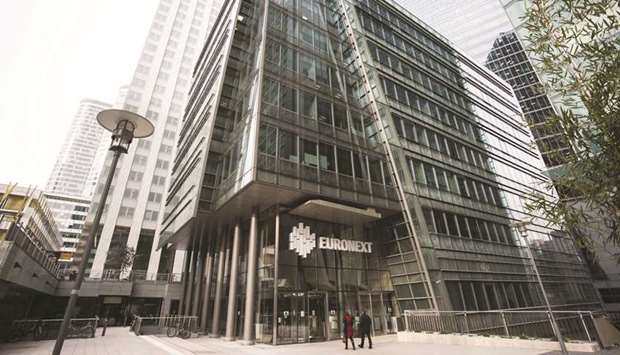European and American stocks ventured higher yesterday following a meltdown in Asia as financial markets seemed to march in lockstep with tweets by US President Donald Trump on the trade front.
The yuan hit an 11-year low after Trump ramped up his trade war with China by hiking tariffs on more than half-a-trillion dollars worth of imports.
But Asian investors later pared steep losses when the president said that a fresh round of talks between US and Chinese negotiators would “start very shortly”.
“China called last night...said let’s get back to the table, so we’ll be getting back to the table,” Trump told reporters.
“This trade war is having more plot twists than a Quentin Tarantino movie,” said Edward Moya, an analyst with Oanda.
Trump later added that trade talks with China were “more meaningful than at any time”, prompting cautious buying first in Europe and then later on Wall Street, where the Dow Jones index clawed back around 1% by the late New York morning, having lost 2.4% on Friday.
At a G7 meeting in France, Trump also said Beijing had no choice but to give in to US pressure in the trade war.
“Good news or bad, investors continue to wear trade war emotions on their sleeves,” said Stephen Innes, an analyst at Valour Markets.
Trump’s trade decision on Friday had stunned investors who ran for the hills, hammering European and Wall Street stocks.
Safe havens such as the yen and gold — go-to assets in times of turmoil and uncertainty — surged.
Friday’s tariff hike came in response to Beijing’s decision to raise levies on $75bn of US goods.
US tariffs on $250bn of Chinese goods are to rise to 30% and those planned on $300bn in Chinese products are to go to 15% from October 1.
Many investors no longer trust Trump’s statements, even when they appear to be reassuring, analysts said.
“Despite President Trump’s tweets reflecting positive discussions between the two countries, actions show the opposite,” said Hussein Sayed, chief market strategist at FXTM.
“It now seems to many market participants that negotiations may get out of control, and likely lead to steeper selloff in risk assets.”
China’s yuan currency fell briefly to its weakest level since early 2008 at the height of the global financial crisis.
“The gloves are coming off on both sides and as such yuan depreciation is an obvious cushion against US tariffs,” Mitul Kotecha, a senior emerging markets economist at Toronto-Dominion Bank, said.
The flight to safer havens saw gold jump to a six-year high, while the Japanese yen touched its strongest level since the end of 2016.
But both assets pared their gains later, and oil rebounded amid rekindled trade talk hopes, before trading mixed in late European business.
Trade war news overshadowed a broadly dovish speech by Federal Reserve boss Jerome Powell on Friday, where he pledged to ensure US growth and pointed to fresh stimulus if inflation softens.
Back in Europe, investors took a dim view of a German business leader survey showing their confidence fell to its lowest level since 2012 in August.
“Germany is on the threshold of a technical recession,” said KfW economist Klaus Borger.
In Frankfurt, the DAX 30 closed up 0.4% to 11,658.04 points and Paris — CAC 40 ended up 0.5% to 5,351.02 points yesterday. London was closed for public holiday.

Visitors arrive at the Paris Stock Exchange, operated by Euronext in France. The CAC 40 closed up 0.5% to 5,351.02 points yesterday.
